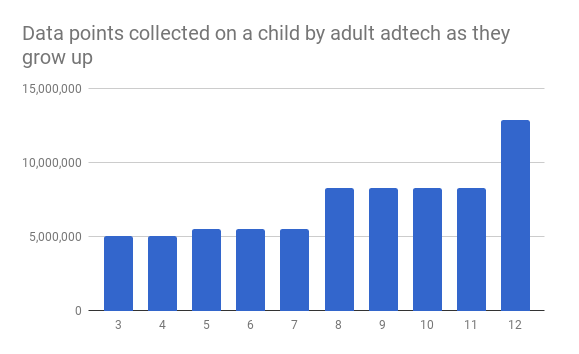 Ad tech companies hold 72 million data points on an average 13 year old from the US, according to research by child focussed ad tech company SuperAwesome. This shocking level of data collection is not the result of companies specifically targeting children, says SuperAwesome, but rather due to adult-oriented ad tech picking up data on children unintentionally. As kids are spending more and more time online, they’re having their data harvested to an ever greater extent as a result.
Ad tech companies hold 72 million data points on an average 13 year old from the US, according to research by child focussed ad tech company SuperAwesome. This shocking level of data collection is not the result of companies specifically targeting children, says SuperAwesome, but rather due to adult-oriented ad tech picking up data on children unintentionally. As kids are spending more and more time online, they’re having their data harvested to an ever greater extent as a result.
Child safety has been a hot topic in ad news recently with YouTube coming under scrutiny for disturbing content involving children being hosted on their platform. But while brands and advertisers have been keen to distance themselves from such content, this new research raises questions about the data they themselves collect on minors.
The findings come from SuperAwesome’s own REX ‘kidtech’ (child-friendly ad tech) platform, which filters out trackers to make sure data isn’t harvested on children, and so can monitor the extent of tracking these kids would otherwise be exposed to. The company says that regardless of how children access digital content, they are exposed to between one and two million trackers each year. It says that 72 million data points by age 13 is probably an underestimate too, as this excludes trackers used by Facebook, Twitter, YouTube, and any other social widgets.
SuperAwesome emphasises that this isn’t necessarily intentional by ad tech and advertisers, but the result of kids spending a lot of time in a digital ecosystem designed at a time when children would rarely use the internet. “Kids are essentially using legacy technology created during a time when online users were mostly adult,” said SuperAwesome’s founder and CEO Dylan Collins.
This is clearly no longer the case. Ofcom’s ‘Children and Parents: Media Use and Attitudes Report’ released last November claims that 94 percent of 8-11 year olds go online, for an average of 13½ hours per week, and even 53 percent of 3-4 years olds use the internet, for an average of nearly 8 hours per week.
The problem has also become more prevalent as more children are using their own device to go online, rather than their parents’, meaning advertisers are building profiles on children specifically. Ofcom says that 39 percent of 8-11 year olds have their own smartphone, and 52 percent have their own tablet.
This data collection is not just worrying from a privacy perspective, but may be lawbreaking too. “Regulations are in place to protect children under 13 from data collection – in the United States, Children’s Online Privacy Protection Rule (COPPA) and in the European Union, General Data Protection Regulation (GDPR),” said Collins.
The ‘kidtech’ sector has emerged as a response to this, aiming to show ads to children in a ‘zero data’ manner. “We need to upgrade the digital media ecosystem with kidtech infrastructure to reflect today’s reality,” said Collins.





